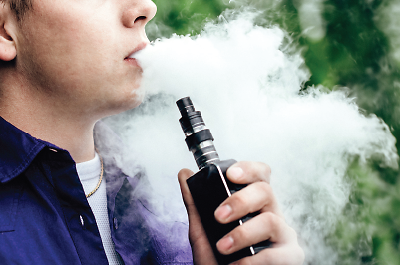FDA to Regulate E-Cigarettes, Other Related Tobacco Products
Abstract
From 2011 to 2015, electronic cigarette use among high school students jumped 900 percent, according to the Food and Drug Administration and the Centers for Disease Control and Prevention.
The Food and Drug Administration (FDA) last month finalized a rule extending its authority to all tobacco products including e-cigarettes, cigars, hookah tobacco, and pipe tobacco. The rule, which goes into effect August 1, makes the products subject to the Food, Drug, and Cosmetics Act and the Tobacco Control Act.

“This is an important landmark decision by the FDA,” said Douglas Ziedonis, M.D., M.P.H., a substance abuse expert and chair of the Department of Psychiatry at the University of Massachusetts Medical School. “It closes loopholes in manufacturing as well as in marketing, especially marketing toward youth. The new ruling is a vital public health strategy,” he told Psychiatric News.
Although the use of conventional cigarettes by youth has declined over the past decade, their use of other tobacco products has escalated rapidly. A survey by the FDA and the Centers for Disease Control and Prevention found that current e-cigarette use among high school students skyrocketed from 1.5 percent in 2011 to 16 percent in 2015, and hookah use has also risen significantly.
While there was previously no federal law prohibiting retailers from selling e-cigarettes, hookah tobacco, or cigars to people under age 18, the rule bans sales to minors and requires sellers to verify the purchaser’s age using photo ID. In addition, the sale of tobacco products in vending machines (unless in an adult-only facility) and distribution of free samples is forbidden.
The new rule will require e-cigarette manufacturers to meet premarket approval requirements. They will have to either show their e-cigarettes are appropriate for the protection of public health or their products are similar to those on the market as of February 15, 2007.
The tobacco product review process gives the agency the authority to evaluate ingredients, product design, and health risks, as well as their appeal to youth.
Under staggered timelines, the FDA expects that manufacturers will continue selling the newly regulated products for up to three years while the companies submit new tobacco product applications for FDA review. The FDA will issue an order granting marketing authorization where appropriate; otherwise, products will face FDA enforcement.
“Overall the best thing about this new regulation is its implications for protecting our youth,” said Ziedonis. He told Psychiatric News that he would also like to see more discussion concerning legislation that shifts the legal age for use of tobacco products from 18 and 19 years to 21, which has been achieved in such states as California and Hawaii and in a few municipalities throughout country. ■



